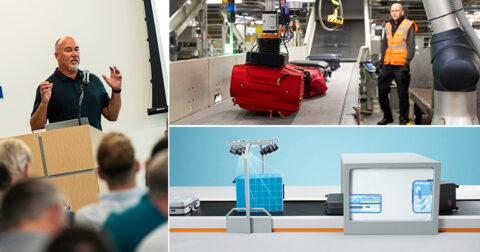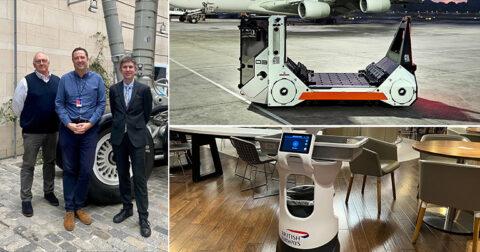Accessibility is undoubtedly an important topic right now and features in FTE’s ‘12 technology and CX trends that can enhance airline and airport operations in 2024’. Progressive airports and airlines are exploring tech-focused solutions to enhance accessibility, such as the Ostrum platform – an Uber-style service designed to solve many of the issues currently experienced by those requiring airport special assistance, which is live at London Luton Airport and London Gatwick. Both airports have a forward-thinking approach to innovation – indeed, London Gatwick was the first-ever Corporate Partner of the FTE Digital, Innovation & Startup Hub when it launched in 2018, and London Luton is the latest to join. Abhi Chacko, is a Board Member of Ostrum. In this interview, he speaks on behalf of Ostrum, sharing more details about this “open platform” approach to accessibility.
Future Travel Experience is placing a big focus on accessibility in 2024. A recent virtual meeting of the FTE Digital, Innovation & Startup Hub specifically explored the potential of autonomous wheelchairs, while innovative approaches to accessibility will also be discussed in-depth in the FTE Accessibility Symposium at FTE Global (Los Angeles, 28-30 October 2024).
Find out more about the FTE Digital, Innovation & Startup Hub >>
Ostrum was established by Chacko back in 2020. It is a multi-airport/multi-airline platform built from the ground up for special assistance at airports and is designed to address the many challenges experienced by passengers with reduced mobility (PRMs). Before travel, for example, PRMs are not able to inform the airport of key details in advance, such as when they will arrive, where they want to meet the assistance agent, the number of bags, which stages they need assistance in and what their specific requirements are. During travel, if they face any issues – such as wheelchair damage – it is very difficult to give feedback or raise complaints, while on arrival PRMs are sometimes left on arriving planes awaiting assistance agents for a long time.
“Technology has made many aspects of our life, work and travel easy – however, passengers who require assistance at airports still have to follow exactly the same procedure that was set 30 years ago,” Chacko explains. “Ostrum allows all parties involved in airport special assistance to perform their respective roles. This includes passengers, their carers, check-in agents, boarding agents, turn coordinators, stand allocators, cabin crew, pilots, assistance agents, assistance control room, airline HQ and airport HQ. For example, it allows passengers to make assistance bookings, see who is going to assist them, be in touch with the assistance provider throughout the journey and provide feedback at the end of the journey – pretty much similar to your taxi hailing app. Such an approach massively reduces anxiety and improves their experience. It allows cabin crew to see whether all the PRMs have booked for receiving assistance at the arriving airport. If required, they can book assistance for additional passengers. Turn coordinators can also see which aircraft are carrying personal wheelchairs which need to be brought to the gate after arrival.”
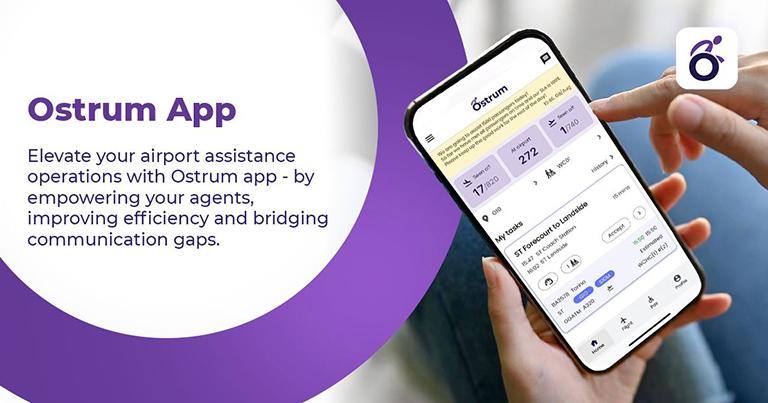
Core Ostrum platform live at London Luton Airport and London Gatwick – new facets rolling out in coming months
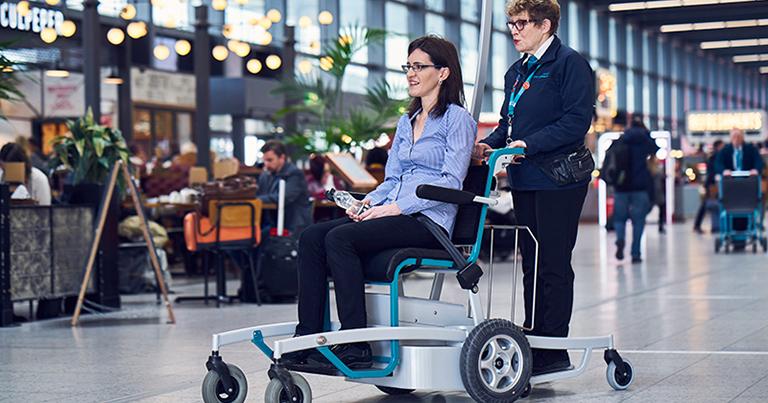
The core Ostrum platform manages assistance bookings, resource allocation and operations, and went live at London Luton Airport in March 2022 and at London Gatwick in August 2023. “The assistance team has given extremely positive feedback about it, mainly on four aspects – the Ostrum platform is well designed, very fast, comprehensive in functionality, and has an agile team,” says Chacko.
There are many other facets to the platform, such as a passenger-facing app, cabin crew engagement solution, auto-allocation bot, and analytics for airlines. These are expected to be rolled out by the airports in the coming months.
“I recognise that we have to move from a ‘closed system’ approach to an ‘open platform’ approach for the aviation sector to improve operational efficiency and passenger experience,” Chacko shares. “Ostrum is an attempt to promote the ‘open platform’ approach in the special assistance segment among all the stakeholders, while respecting the sensitive nature of some of the data – meaning each passenger should be able to see their data; each assistance agent should be able to see the tasks or passenger data related to them; each cabin crew should be able to see the list of passengers in their flight; each airline should be able to see their passenger stats/complaints; and each airport should be able to see that airport’s data.”
“Adopt an ‘open platform’ approach to special assistance to improve efficiency, reduce cost and deliver great service”
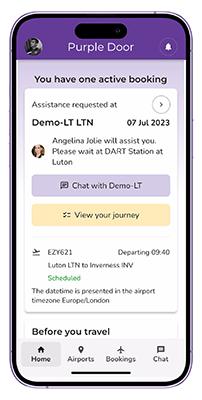
Ostrum is a company dedicated to transforming special assistance using technology and has a team of 20 people fully focused on this mission. “We are very much aware that airport special assistance is a limited market of about 1% of passengers,” says Chacko. “Although the company can’t grow massively, and the market is limited, we believe that we add value to this segment of passengers who have been neglected. We will stay focused on this mission for the foreseeable future. In the past three years, we were able to build the best platform in the world for special assistance, raise capital and become financially stable. We invest 50% of our revenue in product development and very little on marketing. This is deliberate as we want to ensure that our platform speaks for itself. And we prefer to work with airports, airlines and special assistance providers who recognise the need for transformation and are willing to take the necessary steps for it.”
The platform currently handles close to a million PRMs annually and Ostrum expects that to be five million annually, in five years. Chacko adds that, after having two airports in the UK onboard within two years of launching, Ostrum anticipates many airports in Europe, India and North America will adopt the platform in the coming years. “When it comes to improving airport experience, we shouldn’t leave the passengers who require assistance behind. Adopt an ‘open platform’ approach to special assistance as you have to allow many people on the ground to collaborate to improve your efficiency, reduce your cost and deliver a great service. We are laser focused on airport special assistance and that’s all we do. If you want a technology partner to help improve special assistance at your airport, we would love to work with you.”
Chacko has led many innovations in the industry in the past as the Head of Innovation of London Gatwick. However, Ostrum is a private independent company founded by Chacko and is not related to London Gatwick.
Find out more about the FTE Digital, Innovation & Startup Hub >>FTE Accessibility Symposium to take place at FTE Global – Los Angeles, 28-30 October 2024

Learn more about accessibility in the FTE Accessibility Symposium at FTE Global (Los Angeles, 28-30 October 2024). Widely regarded as “the CES for aviation”, FTE Global will once again be co-located with APEX/IFSA Global EXPO, forming the largest gathering of air transport executives from around the world in North America in 2024. Our event theme, which will permeate every aspect of the show, is “Transforming Air Transport” and attendees will have access to a large-scale end-to-end exhibition, multiple conference tracks featuring inspirational speakers from inside and outside of the air transport industry, unique social and networking events, co-creation workshops, government agency briefings, Think Tank unveilings, our largest ever startup showcase, and powerful networking tools so that engagement opportunities between participants are unrivalled.
Register for FTE Global 2024 >>
